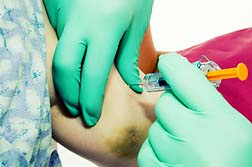 Donna Castellone, MS, MT(ASCP)SH is an instructor in the Department of Pathology with the Mount Sinai School of Medicine, Research Co-coordinator for Translational and Applied Laboratory Medicine, and Coagulation Consultant for the Special Coagulation Laboratory. Castellone is also an adjunct at SUNY Stony Brook, New York and a guest lecturer at University of Medicine and Dentistry at New Jersey.
Donna Castellone, MS, MT(ASCP)SH is an instructor in the Department of Pathology with the Mount Sinai School of Medicine, Research Co-coordinator for Translational and Applied Laboratory Medicine, and Coagulation Consultant for the Special Coagulation Laboratory. Castellone is also an adjunct at SUNY Stony Brook, New York and a guest lecturer at University of Medicine and Dentistry at New Jersey.In July Boston, Massachusetts was host to the International Society of Thrombosis and Hemostasis. Among the topics studied that week, was the reaction some patients have to Heparin.
Specifically, Heparin-induced thrombocytopenia or HIT.
Writing in an August 3rd posting on Aniara.com, Castellone explains that HIT is an immunologic adverse effect of heparin therapy that causes antibody mediated platelet activation and thrombin generation. That's medical lingo, but in layman's terms the drug that "is supposed to prevent clotting has now caused a clot," Castellone explains.
Patients affected by heparin in this way will have a 50 per cent drop in platelet count and a new thrombosis, or blood clot. Assuming a first exposure to heparin, this blood clot from a drug that is supposed to prevent blood clots will happen on the fourth day.
That all changes, explains Castellone, if a patient had been previously exposed to Heparin, even in small doses. In this instance, the clot will occur after one or two days.
READ MORE HEPARIN LEGAL NEWS
In those receiving Heparin through an IV, symptoms may occur when the infusion is started. Among them: fever, chills, high blood pressure, a fast heart rate, shortness of breath and chest pain. This happens in about a quarter of people with HIT. Others may develop a skin rash consisting of red spots.
All this without a hint of Heparin contamination. And yet for some, Heparin injection with quality Heparin can be just as nasty as with the tainted variety.
